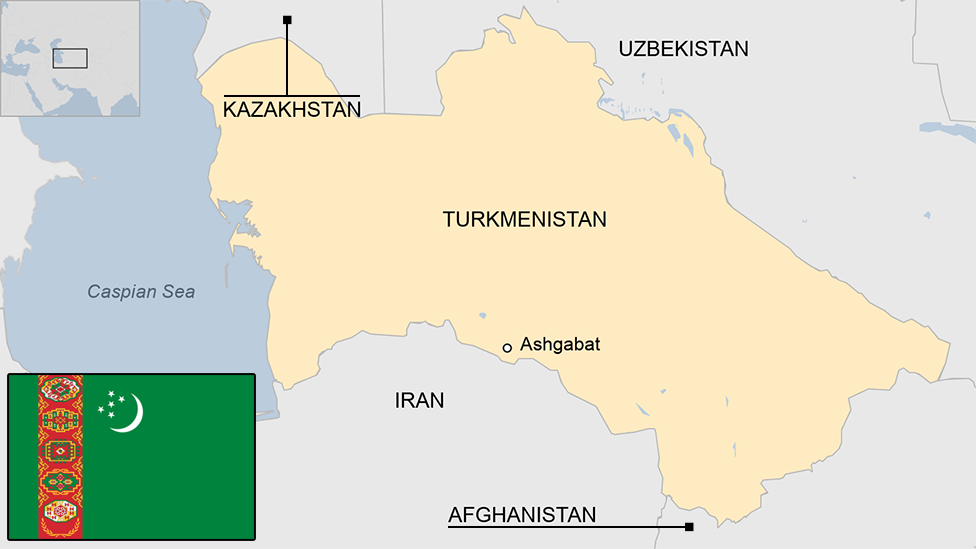Has Turkmenistan changed at all?
- Published
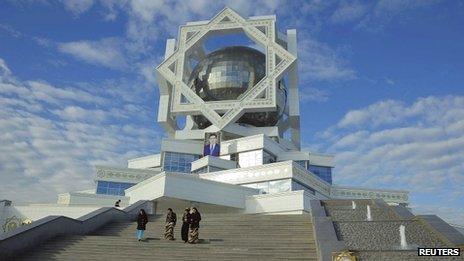
The president may have changed but many grandiose monuments remain
Five years after the death of long-time leader Saparmurat Niyazov, Turkmenistan is holding elections. The BBC's Rayhan Demytrie asks whether the closed Central Asian nation has changed under its new president, who is assured of a landslide win.
"People will vote for the current president because there is no other choice, other candidates are some minor people," said a young Turkmen student.
She did not want to reveal her identity for security reasons, but said she was proud that she would be voting on Sunday.
"It's going to be my first vote!" said the woman, who is studying at one of Kazakhstan's universities.
Sunday's election is only the second ever held in independent Turkmenistan. The previous leader, Saparmurat Niyazov, did not bother with such formalities - he was simply declared president for life.
But when he died suddenly in December 2006, former Health Minister Gurbanguly Berdimuhamedov replaced him in polls in which he secured 89% of the vote.
After years of repression and absolute rule by a leader who erected golden statues of himself across the country, there were hopes that a new leader would bring change.
Gurbanguly Berdimuhamedov declared that he would follow the political course set by his predecessor, but he also promised reform.
Turkmen rights activists, most of whom live in exile in Europe, note some changes but say they are far from meaningful reform.
"In the past five years we have not seen strong political repression like that witnessed under Niyazov in 2002-03," says Tadjigul Begmetova, the founder of Turkmenistan Helsinki Foundation.
"But there is still no political life. There is no civil society, and it's impossible to create or register public organisations."
New personality
One noticeable change is that portraits of the previous leader hanging from every imaginable public space have been replaced by those of the incumbent.
With his neatly combed shiny black hair, Gurbanguly Berdimuhamedov's portraits hang in aircraft, taxis, hotel lobbies, conference halls, cafes and restaurants.
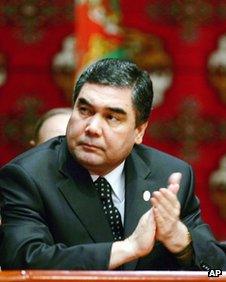
Mr Berdimuhamedov has put some money into health and education
He is a permanent fixture on state television, which shows government ministers bowing when shaking his hand and waving in sync as he boards a plane, or diligently taking notes as their president barks orders.
In addition, Mr Berdimuhamedov writes books, rides horses, races cars and sings romantic songs.
"Berdimuhamedov grew up and made his political career under President Niyazov," said Tajigul Bermetova.
"At that time ministers were not allowed to travel so Berdimuhamedov is not familiar with any other form of governance. This is why he is now creating his own cult of personality."
The Turkmen authorities have spent billions of dollars of public money on grand construction projects of little immediate benefit for the population, including a resort of luxury marble-fronted hotels on the Caspian Sea.
Public healthcare standards remain low despite recent spending on new hospitals and medical equipment. According to a 2009 Wikileaks cable, people prefer the old Soviet hospitals because the new facilities lack adequately trained staff.
The current president has reversed some of the more damaging policies of his predecessor, such as the decision to cut compulsory education from 10 to nine years. But there are not enough university places and many young students leave the country to study abroad.
The president did allow the internet into the country - but access is tightly controlled. Websites such as Facebook and YouTube are banned, and private internet connections can cost up to $6,900 (£4,354) a month.
In internet cafes, visitors have to show their passports and register in a logbook.
"Rigid censorship and virtually total control of electronic correspondence are rampant," said Farid Tukhbatulin, from the Austria-based rights group Turkmen Initiative for Human Rights.
Turkmenistan remains largely closed to foreign media. Journalists are only allowed to visit when the authorities want publicity for public events such as industry conventions.
Electing the 'king'
But none of these issues are to be found on the presidential candidates' agendas.
The seven candidates running against the president head government ministries or state-owned companies. But they have declared their loyalty to Mr Berdimuhamedov and stand no chance of beating him.
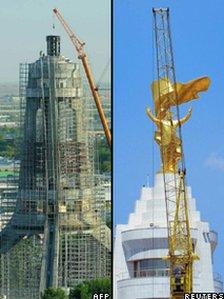
Aspects of President Niyazov's personality cult have been dismantled
Official Turkmen media has mentioned meetings held by presidential candidates but nothing compares to the scale of publicity enjoyed by Mr Berdimuhamedov.
"The meetings with the candidates were held in public halls where the president's portraits are hanging on the wall," said popular Turkmen blogger Annasoltan, who writes for neweurasia.net.
"In state companies and organisations, some bosses have openly said they are going to vote for the president, one of them even referred to the president as our king and called on the labour force to vote for him."
The Organisation for Security and Co-operation in Europe (OSCE) says it will not be sending observers to monitor the elections. It said an observer mission would not add value because fundamental freedoms continued to be restricted.
Some believe the only point of this election is to create the impression that Turkmenistan is abiding by international norms.
That matters because with its abundant natural gas reserves, Turkmenistan is keen to diversify its export routes. BP ranks its natural gas reserves as the fourth largest in the world.
Russia and China are the biggest buyers, but the EU is also seeking a share. In doing so it has been criticised by rights groups for doing business with one of the most repressive regimes in the world.
"The European Union in particular continues to press forward with a Partnership and Co-operation Agreement (PCA) with Turkmenistan, frozen since 1998 over human rights concerns, without requiring any human rights reforms in exchange," said Human Rights Watch in its World Report 2012.
The report details a lack of basic freedoms, constant threats of government persecution of human rights defenders, and allegations of widespread torture, ill treatment and disappearances of people in custody.
Back in Almaty, the Turkmen student who plans to go back home after finishing her studies does not believe there will be any changes after the elections.
"I think while all of those people with old Soviet mentality are alive, nothing will change," she said.
"It will take ages for Turkmenistan to get to the level of democracy that exists in other countries. But we have to keep trying."
- Published17 May 2011
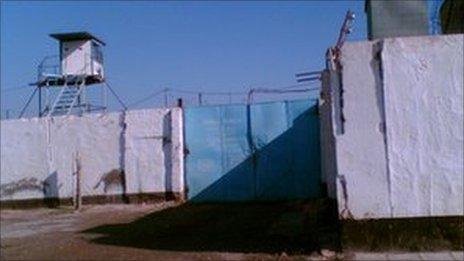
- Published26 August 2010
- Published24 March 2023
